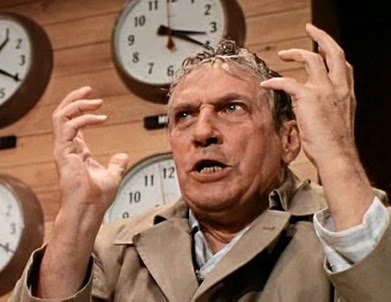It was a Howard Beale moment for the Tea Party, which is up in arms that Cochran pulled in Democrats to lift him over their favorite, Chris McDaniel, in the Mississippi GOP Senate run-off election. Craig Shirley, a conservative political consultant and "biographer" of Reagan called it "a win with an asterisk." I guess we could say the same about Reagan, who wouldn't have won in 1980 and 1984 if it wasn't for the massive Democratic crossover vote, particularly in the Deep South.
The so-called "Southern strategy" had been in place since Goldwater carried a handful of traditionally Southern Democratic states in 1964. Nixon would later exploit this vote in 1968, thanks to a little help from George Wallace. Even Ike couldn't carry the South in 1952 and 1956 against an effete intellectual, Adlai Stevenson, from Illinois. Lyndon Johnson helped secure most of the South for Kennedy in 1960. Of course, many of these Dixiecrats eventually turned Republican, but not until after Reagan was elected. The big demographic shift was in the 80s, despite earlier party changes, like that of Reagan himself, in the 60s.
It seems the Tea Party thought they had this one in the bag as McDaniel held a slim lead after the first primary and they figured that supporters of Thomas Carey, a Libertarian, would vote for their man. The surprising loss left the McDaniel camp shellshocked, with their man refusing to admit defeat, and potentially challenging the results in court.
Conservative political action groups had sent monitors to make sure Democratic voters didn't vote twice, which evoked the Jim Crow era, as blacks were the ones expected to cross over and vote for Cochran. In Mississippi, you don't have to vote in your particular primary but can vote in the other party's primary. Apparently, enough Democrats felt the real choice was between Cochran, who has funneled a lot of federal dollars to poor rural areas in Mississippi during his 6 terms in the Senate, and McDaniel, who threatened to cut this support. Whoever won the Republican primary would most likely win the general election as Travis Childers, the Democrat, isn't given much of a chance. How many Democrats crossed over remains to be seen, but it didn't take many to turn this election as Cochran won by 6,400 votes.
It was a bruising night for the Teabaggers, as all their Senate hopefuls fell in Republican primaries. Oklahoma Republican James Lankford, who was also targeted by Tea Party groups, had no problem beating back T.W. Shannon and a handful of other conservative candidates, much to the chagrin of Ted Cruz and Sarah Palin, who had heavily supported Shannon.
McDaniel had Palin, Santorum and other TP leading lights campaigning for him in Mississippi, which once again shows these elections are no longer local. Tea Party groups from all over the country poured money into McDaniel's campaign. You can bet there was "dark money" too, as it turns out was the case in David Brat's so-called "grass roots" victory over Eric Cantor.
The defeat of Cantor appears to be a one-off victory, but there is no doubt the Tea Party still plays a disruptive force in the GOP, forcing "establishment" candidates to spend heavily in the primaries, leaving them vulnerable in the general election. The Tea Party has also forced GOP leaders further to the right on key issues like immigration, which seemed to be the driving force in the primaries, not "Obamacare."
The surge in illegal immigration the past few months has once again made this a hot button issue. It is unlikely that we will see any immigration reform bill move through the House, given the current shake-up. The focus of the House now appears to be on Obama because of his recent executive decisions. House Speaker John Boehner has threatened a "massive" law suit. The President is at an all-time low in popularity, making him an easy target this summer.
This type of grandstanding is what we have come to expect from the Republicans, who have refused to work with the President in any meaningful way. As a result, Obama has been issuing executive orders to bypass Congress, including his latest one on carbon emissions, which even has fellow Democrats upset.
But, these GOP primaries has been more about replacing entrenched Republicans with new conservative faces, as Teabaggers feel that Senators like Thad Cochran are RINO's, having sold out to the Washington establishment. The fact that Cochran had to rely on Democrats to pull off his comeback victory only serves to vindicate their position.



Comments
Post a Comment